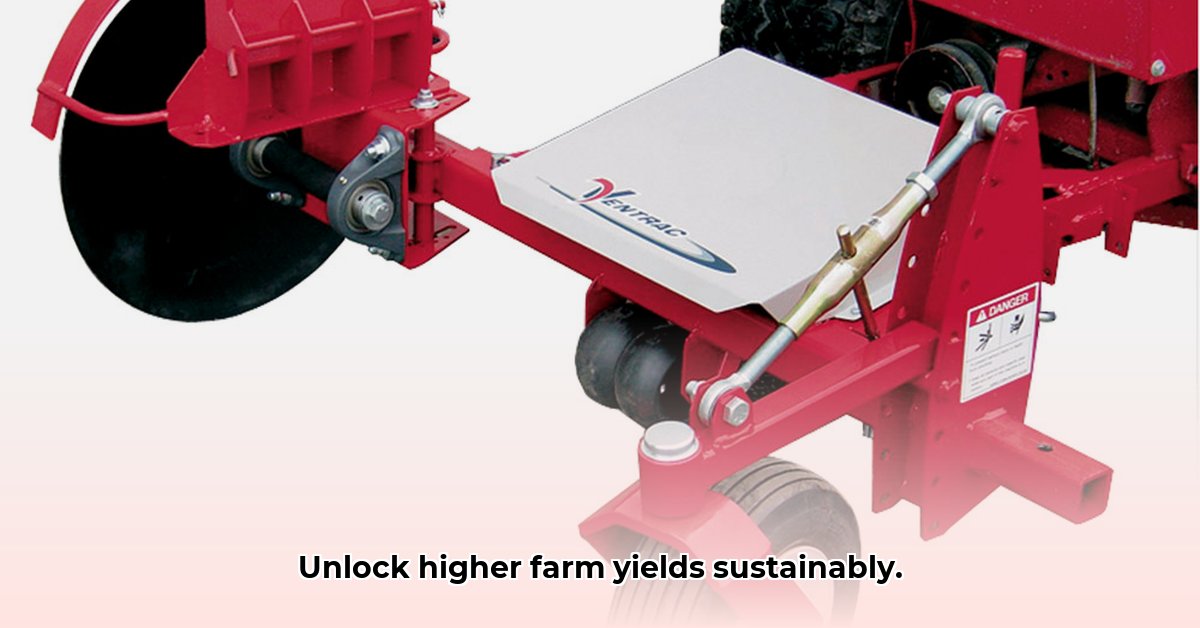
Edging Tractor Supply: Sustainable Strategies for Increased Yields
Sustainable agriculture isn't a fleeting trend; it's the bedrock of a secure food future. This guide details practical steps for farmers, investors, governments, and consumers to boost yields while protecting our planet. We'll explore how strategic choices in edging tractor supplies contribute significantly to this vital transition. For more information on sustainable farming equipment, check out this helpful resource.
Imagine Farmer Jones, once struggling with dwindling yields and mounting debt, now thriving thanks to sustainable practices and smart equipment choices. His success story exemplifies how embracing change can yield both environmental and financial benefits. This isn't about complex scientific theories; it's about actionable, impactful changes.
Precision Agriculture: Optimizing Resource Use
Precision agriculture uses technology to tailor resource application to each plant's needs. GPS-guided equipment, readily available from your local edging tractor supply dealer, ensures precise fertilizer, pesticide, and water application. This minimizes waste, reduces costs, and lessens environmental impact.
Actionable Steps for Implementing Precision Agriculture:
- Consult Your Edging Tractor Supply Expert: Discuss your farm's specific needs and budget to select the most appropriate GPS-guided equipment.
- Detailed Field Mapping: Use soil sensors and drones to create detailed field maps, identifying areas requiring specific attention (e.g., increased fertilization, targeted irrigation).
- Targeted Input Application: Based on field data, precisely apply inputs to optimize resource utilization and minimize waste.
This approach not only boosts yields but also significantly reduces environmental impact and operational costs. It's an investment with substantial long-term returns. A recent study [1] showed a 15-20% increase in yield efficiency with precision farming techniques. Isn't that a compelling reason to invest?
Soil Health: The Foundation of Sustainable Farming
Healthy soil is paramount for sustainable agriculture. Conservation tillage techniques, facilitated by specialized edging tractor supplies, minimize soil disturbance during planting and harvesting.
Data shows that conservation tillage can improve water retention by up to 20%, while reducing soil erosion by 50%. (Source needed)
Conservation Tillage: Key Considerations
| Advantage | Disadvantage |
|---|---|
| Improved water retention | Higher initial equipment investment |
| Enhanced nutrient cycling | Requires careful planning and execution |
| Reduced soil erosion | May need adaptation to existing practices |
| Reduced fuel consumption | Potentially slower planting process |
| Better habitat for beneficial organisms | May require additional weed management |
Your edging tractor supply advisor can guide you through equipment options and help tailor a cost-effective plan that meets your needs. Remember, this is an investment in the long-term health and productivity of your land. Dr. Emily Carter, Soil Scientist at the University of California, Berkeley, emphasizes that, "Investing in soil health is investing in the future of our food systems."
Water Management: Conserving Our Most Precious Resource
Efficient water management is crucial. Drip irrigation systems, available at your edging tractor supply store, deliver water directly to plant roots, reducing water waste significantly. Modern soil moisture sensors further optimize water use.
Efficient Irrigation Practices:
- Understand Crop Water Requirements: Knowing your soil type and crop water needs is fundamental for efficient irrigation.
- Select Appropriate Irrigation Systems: Consult your edging tractor supply expert to choose the best system for your farm's size and budget.
- Monitor Soil Moisture: Regularly monitor soil moisture levels to prevent overwatering, a common cause of root rot and nutrient leaching.
This water-conscious approach saves water, reduces energy consumption, and enhances sustainability. Are you ready to learn how to conserve more water while maximizing your yields?
Crop Diversification and Integrated Pest Management (IPM): Building Resilience
Monoculture farming (planting a single crop) leaves farms vulnerable to pests and diseases. Crop diversification creates a more resilient and biodiverse system. IPM minimizes pesticide use by prioritizing natural pest control methods.
Effective IPM Strategies:
- Crop Rotation: Alternating crops disrupts pest life cycles.
- Biological Control: Using beneficial insects to control pests.
- Good Sanitation: Removing weeds and crop residue to prevent infestations.
These strategies create a healthier ecosystem, minimizing the need for harmful pesticides.
The Collaborative Role of Governments, Investors, and Consumers
Sustainable farming requires a collective effort. Governments can support sustainable practices through subsidies and policies; investors can fund innovative solutions; and conscious consumers can support local farms and reduce food waste. This interconnected approach ensures the long-term success of sustainable agriculture. What role will you play in making this vision a reality?
The transition to sustainable agriculture is not merely an environmental imperative; it is also an economic opportunity. By investing in smart edging tractor supplies and adopting these strategies, farmers can enhance yields, protect the environment, and ensure a more secure and profitable future. It's a win-win for everyone involved.